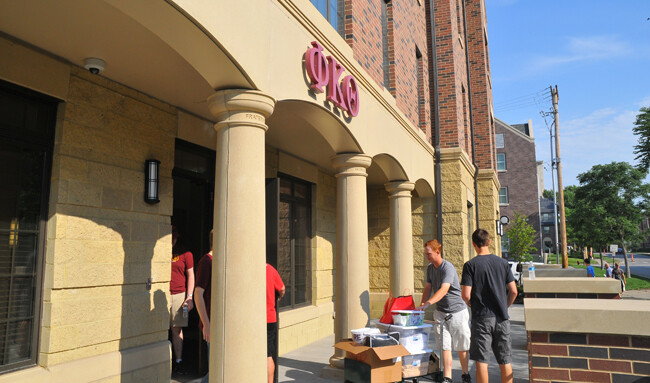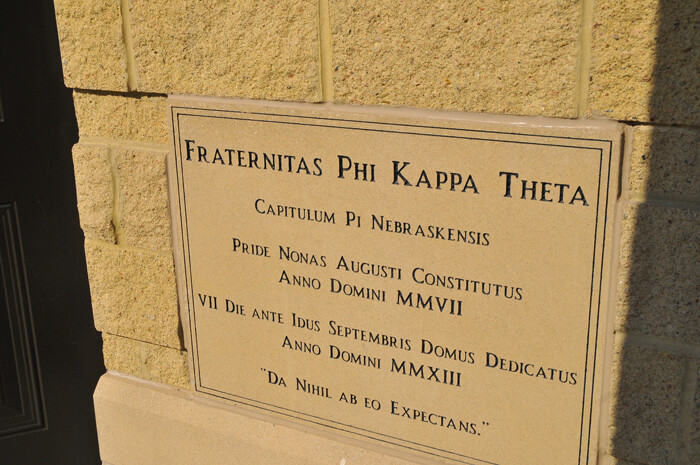
With the Phi Kappa Theta fraternity house opening on campus this fall, UNL is joining a handful of public universities with new housing facilities that cater to students’ religious faith.
At the start of the fall 2013 semester, 55 young men moved into the newly constructed $4 million house, developed and financed as part of a $25 million upgrade of Roman Catholic facilities serving the UNL campus. The effort includes a new $18 million, 650-seat, church now under construction.
In recent years, religious-based housing has popped up at Purdue University, Troy University and the University of Illinois, among others.
Students are not required to belong to the Catholic Church to join the fraternity, nor are they required to participate in Bible study or other religious activities, said the Rev. Robert Matya, chaplain of UNL’s Newman Center and a leader in the effort to establish the fraternity.
It is a place for like-minded students to live together and, if they wish, pursue their faith. The house is to serve as “a beacon, not a bunker,” Matya said, quoting a slogan often used by fraternity members. UNL officials said they welcome the efforts of the Newman Center and other religious organizations to serve and support students interested in a faith-oriented lifestyle.
“They help us recruit and retain students,” said Juan N. Franco, vice chancellor of student affairs. “It’s another option for students.”
The Phi Kappa Theta house is university-approved housing, meaning the facility can be used to meet UNL’s requirement that freshmen live on campus. So it must comply with UNL’s safety requirements and its rules against discrimination.
Matt Hecker, UNL’s Dean of Students, said UNL is in the vanguard with its resurgence of religious faith on a secular campus.
UNL’s Catholic congregation outgrew the 300-seat St. Thomas Aquinas church, which was torn down and is being replaced by a much larger building. UNL’s Newman Center now conducts four Sunday masses, which are often standing room only. It moved to temporary quarters in the former Wesley House, a United Methodist chapel, until construction is completed.
“In an American youth culture predominated by narcissism and the self-glorification found on Facebook and the number of Twitter followers, Instagram, instant gratification, easy access to alcohol, and celebrating the hook-up mentality, here’s an ancient church renowned for unbending rules and conservative theology, literally tearing down their building because it can’t accommodate the crowds of young people,” Hecker said.
Religious fraternities and sororities aren’t a particularly new phenomenon. Phi Kappa Theta is a national fraternity established in the late 1800s because Catholic men were denied admission to most college fraternities.
It had a chapter at the University of Nebraska in the 1920s but faded away during the Great Depression, Matya said. By the late 1960s the national fraternity ended the requirement that its members be Catholics in favor of a more ecumenical approach. Today, about half of the fraternity’s 50 chapters maintain their Catholic roots.
The fraternity was revived at UNL in 2005 as part of a resurgence of the Catholic church on campus, led by Matya with support from now-retired Lincoln Bishop Fabian Bruskewitz. About 6,000 UNL students self-identify as Roman Catholic, Matya said, making it the largest religious denomination on campus.
“The Phi Kaps have existed for seven years without a house,” he said. “But at this campus, for some reason, Greek chapters thrive if they have a house. A house is a strong part of their identity.” Also, about two dozen women currently belong to the church-affiliated Pi Alpha Chi sorority, which does not have a house and has not yet been officially recognized as a Greek organization with UNL’s Panhellenic Association. For now, it is a recognized student organization, or RSO.
Matya said FOCUS – the Fellowship of Catholic University Students – has been a major catalyst for what has happened at UNL. The college ministry sends teams of young, trained missionaries to campus to reach students with the gospel.
In partnership with the university parish and the Newman Center, FOCUS missionaries offer one-on-one mentoring to student leaders, lead weekly Bible studies and host large outreach events. FOCUS helped change the UNL Newman Center’s focus from “just being here” to being more “invitational,” said Matya, who has been Newman Center chaplain for 16 years.
“When I first came here, students came to church, but we weren’t filling the pews,” he said. “We didn’t need a new church - I never dreamed that would happen.”
Examples of faith-based housing at other public schools
– At Purdue University, a 119-bed, suite-style student housing unit constructed and operated by a conservative evangelical church opened this month just off campus.
– Troy University dedicated a 376-bed residence hall, financed and operated by its private foundation, which also serves as home to the campus’s Catholic student ministry.
– The Catholic ministry at the University of Illinois, which has operated a faith-based residence hall for decades, doubled the hall’s size to 600 beds in an expansion completed in 2008.
The facilities are not limited to those of a particular faith, though they tend to have stricter codes of conduct than non-religious housing facilities, officials said.








